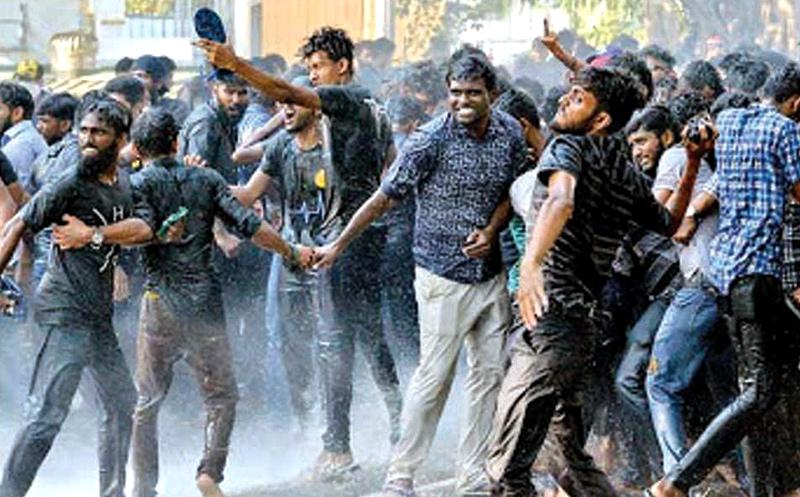
When reading the series of Gunadasa Amarasekara’s novels beginning with ‘Gamanaka Mula’, what strikes the reader is how knowledgeable university students were in the 1950s’. Piyadasa, the protagonist of the novel, albeit educated up to grade twelve, had a thorough grasp of the Sri Lankan nationalist movement beginning with Anagarika Dharmapala.
In the University, he becomes a leading scholar and an expert in international politics including Marxism, religions in the West, Western civilisation and modern literary trends. That was in the 1950s. But the present university student’s knowledge is far below the level of Piyadasa and does not come closer to that of Balamahattaya in the novel.
 Instead of becoming centres of intellectual discourse, Universities have become a place for inhuman ragging, violence and petty demonstrations. Why have Universities become such bad places nowadays? Why isn’t there any meaningful discourse or discussion at these places?
Instead of becoming centres of intellectual discourse, Universities have become a place for inhuman ragging, violence and petty demonstrations. Why have Universities become such bad places nowadays? Why isn’t there any meaningful discourse or discussion at these places?
There may be several reasons for this situation in our universities. One could say it is because of party politics encroaching into universities or the examination-oriented nature of universities or the fact that our students would not have employment opportunities after their graduation. These factors may be true, but the most prominent factor is the influence of globalisation.
Today’s schoolchild is not the one of the past. In the past a schoolchild’s bag contained a heap of books and a box of mathematical tools. However, today, a child’s bag contains CDs, computers, pen drives and the latest mobile phones most of the time. This is especially true for upper grade students. In this way, a child’s mental status has changed today. Those days, children woke up to the sound of the crockerel and commenced reading books after listening to pirith chantings.
Child of today
Today, they would wake up to the alarm bell of the clock or the alarm of the mobile phone. Thereafter, they would not do their homework or any other studies, but go on watching cartoons on television. From then onwards, their timetable would be filled with tuition classes late into the evening and after coming home again, they start watching the television.
A child who leads such a hectic life has no time to admire nature and there is no space to develop any instinct or talents.
This is a sample student of today who would eventually end up in the university. The important fact is that the majority of students who enter the university are products of the television, social media and tuition culture. The question to be asked is not about the absence of discourse in universities or knowledge outside the syllabus, but how they are going to pass examinations.
It is, therefore, clear that all these consequences are the byproducts of globalisation or the invasion of Western culture which comes through television, the Internet, new media and multinational companies. We, who have become pawns on a fast-moving conveyer belt, have no option, but to run as fast as the belt moves, lest we be thrown out.
This is exactly what happened to university students who are also the same as those who run on that belt. Therefore, how can there be a discourse and meaningful dialogue? Today, the university student has become a pawn in the political struggle outside the university too.
Intellectual bankruptcy
One can argue that university students have become empty-headed people who do not engage in any discourse because of the foregoing factors. Though it is true, to a great extent, they themselves are responsible for their plight. Why should they become victims of a cultural invasion?
When University education commenced in Sri Lanka, there were a couple of issues that the university student faced. First was that students were unable to adapt to the university culture though they were well versed in English.
Prof. Ediriweera Sarachchandra described that issue in his autobiography ‘Pin Athi Sarasavi Waramak Denne’. Second, was to find the learning material; that is to find books.
The next issue was to go abroad to face examinations. It is similar to students who passed the London Matriculation examination, having to sit for the Cambridge Senior and the Ceylon Civil Service examinations. Has today’s university student faced such issues? Thanks to globalisation, there is no such issue any more for university students.
There are endless resources which can easily be found on the Internet in terms of the education. Though some of the Internet resources are unreliable, most of them are not.
In the present context, it is not difficult as old times to pursue the knowledge if one really wants to acquire it. Hence, student himself, more or less, is responsible for their plight.
